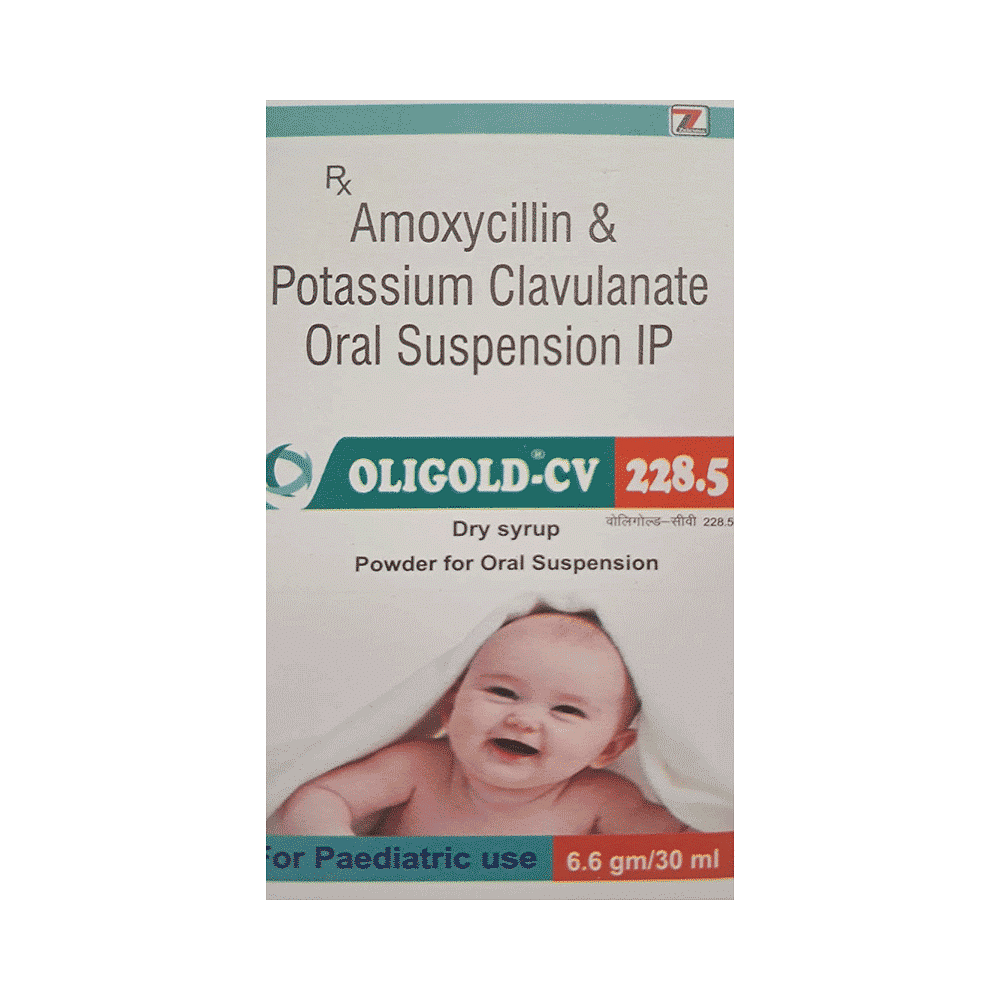
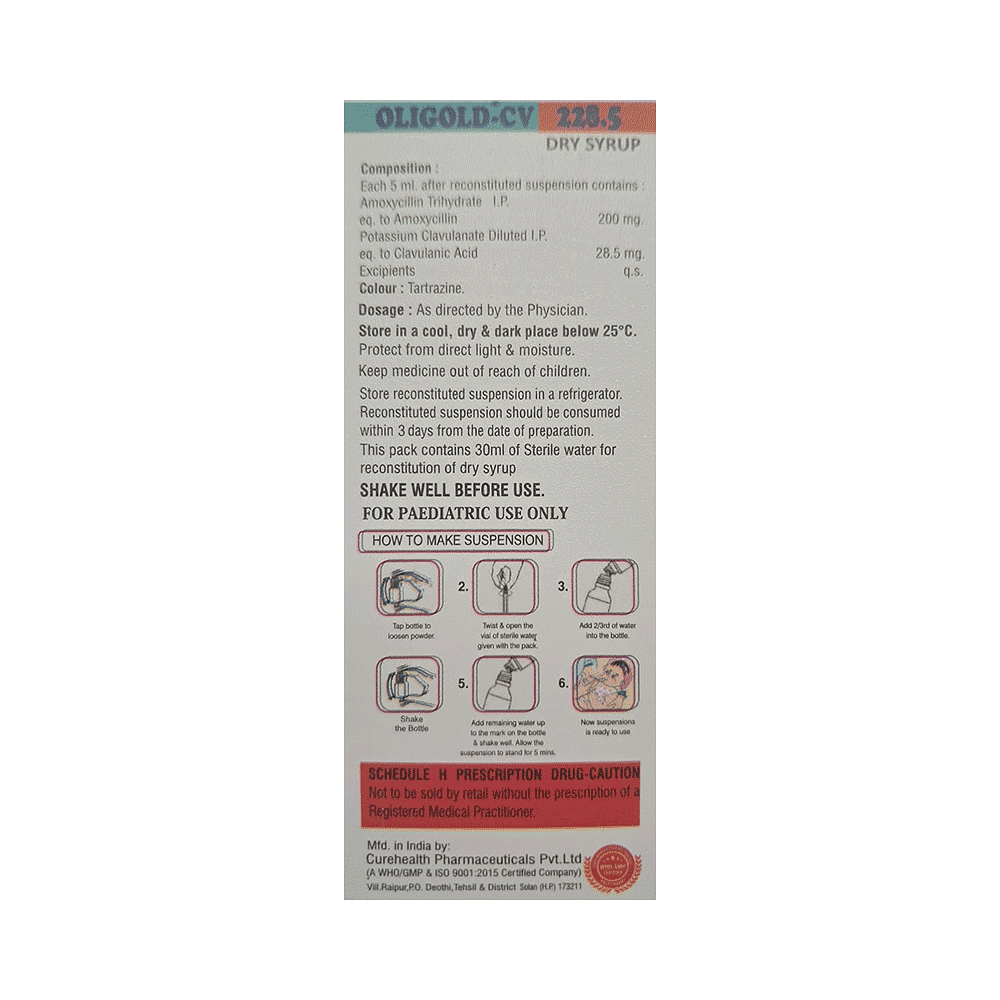
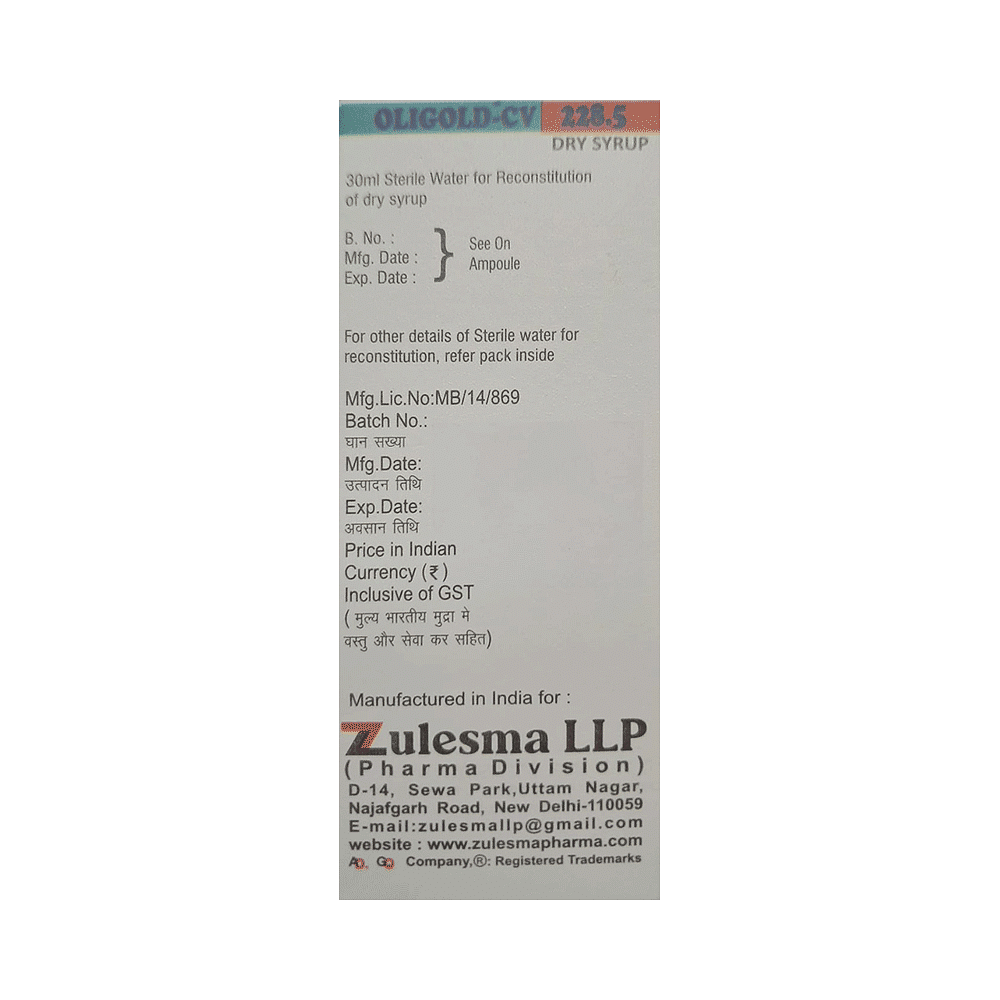
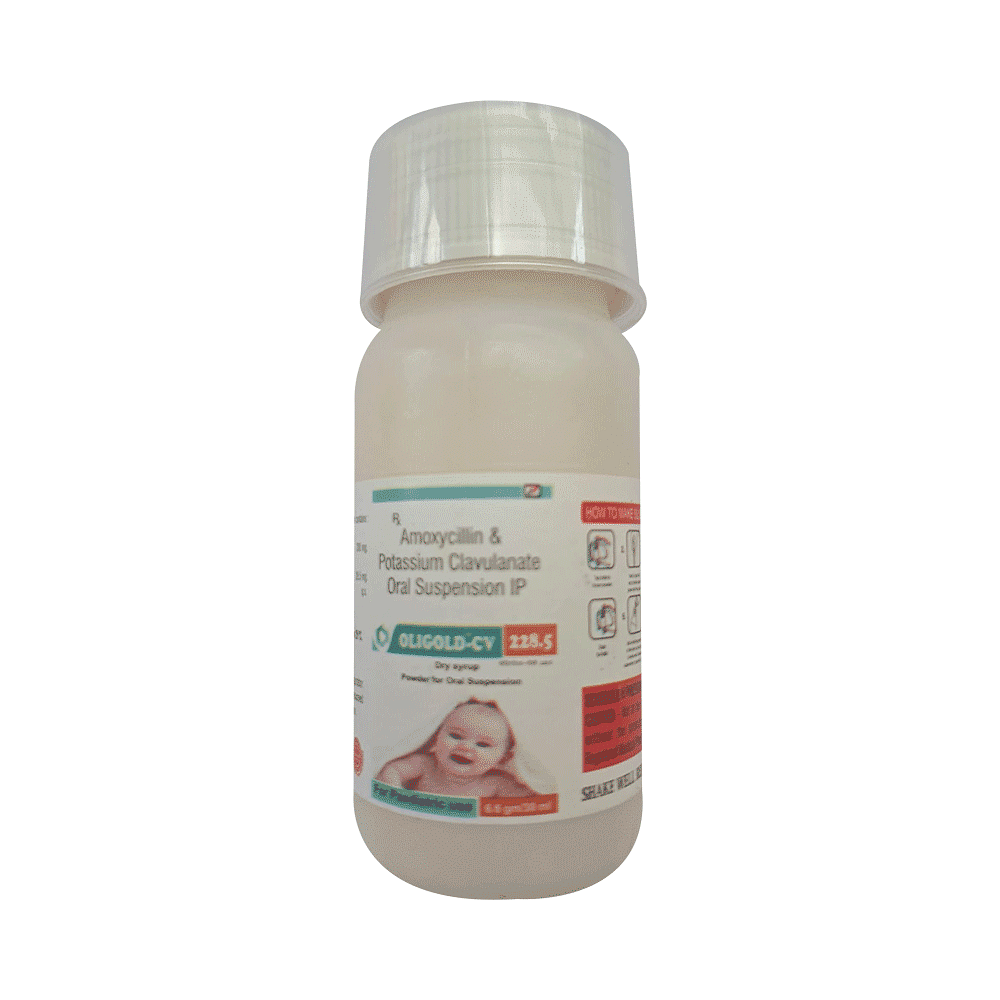
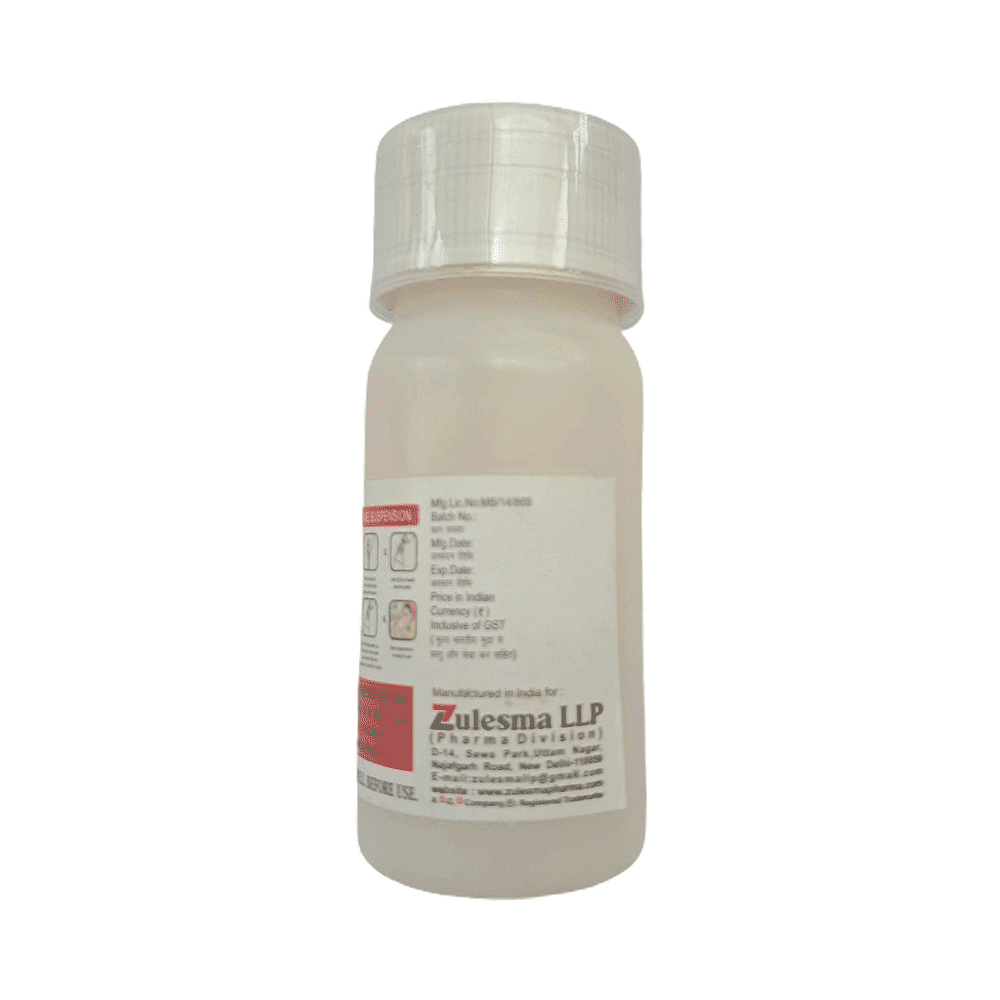
Oligold-CV 228.5 Dry Syrup
Manufacturer
Zulesma LLP
Salt Composition
Amoxycillin (200mg/5ml) + Clavulanic Acid (28.5mg/5ml)
Key Information
Short Description
Oligold-CV 228.5 Dry Syrup is an antibiotic medicine that helps treat bacterial infections of the ear, nose, throat, chest, lungs, teeth, skin, and urinary tract.
Dosage Form
Oral Suspension
Introduction
Oligold-CV 228.5 Dry Syrup is an antibiotic medicine that helps treat bacterial infections of the ear, nose, throat, chest, lungs, teeth, skin, and urinary tract. It is capable of killing bacteria that have become resistant to other therapies and thus also helps treat tuberculosis that is resistant to other treatments. You can give Oligold-CV 228.5 Dry Syrup to your child with or without food. It is better to give it with food as that helps increase absorption and decrease the risk of stomach upset. The doctor may prescribe giving it two to three times a day. Medicine dose depends on the severity of the infection, its type, and your child’s body weight and age.
Directions for Use
Take this medicine in the dose and duration as advised by your doctor. Check the label for directions before use. Measure it with a measuring cup and take it by mouth. Shake well before use. Oligold-CV 228.5 Dry Syrup is to be taken with food.
Safety Information
Side Effects
No common side effects listed
Alcohol Warning
It is not known whether it is safe to consume alcohol with Oligold-CV 228.5 Dry Syrup. Please consult your doctor.
Breastfeeding Warning
Oligold-CV 228.5 Dry Syrup is safe to use during breastfeeding. Human studies suggest that the drug does not pass into the breastmilk in a significant amount and is not harmful to the baby.
Pregnancy Warning
Oligold-CV 228.5 Dry Syrup is generally considered safe to use during pregnancy. Animal studies have shown low or no adverse effects to the developing baby; however, there are limited human studies.
How it works
Oligold-CV 228.5 Dry Syrup is an antibiotic. It has two active agents, amoxycillin and clavulanic acid. Amoxycillin works by preventing the formation of the bacterial protective covering (cell wall) essential for the survival of the bacteria. Whereas clavulanic acid serves a special purpose of inhibiting an enzyme (beta-lactamase) that is produced by resistant bacteria. This makes the combination of amoxycillin and clavulanic acid an effective line of treatment for many types of infections.
Quick Tips
Your child must complete the entire course of antibiotics. Stopping too soon may cause the bacteria to multiply again or cause another infection. Encourage your child to drink plenty of water in case diarrhea develops as a side effect. Never give Oligold-CV 228.5 Dry Syrup until and unless prescribed by the doctor. Do not give Oligold-CV 228.5 Dry Syrup to treat common cold and flu-like symptoms caused by viruses. Never save medicine for future illnesses. It cannot be said whether the same medicine will work on future infections. Check ‘expiry’ before giving Oligold-CV 228.5 Dry Syrup to your child. Immediately discard all the expired medicines. Stop Oligold-CV 228.5 Dry Syrup immediately if your child develops an itchy rash, facial swelling, or breathing difficulty. Report to the doctor without any delay.
Related Medicines

Amox C k@re Oral Suspension

Invoxin-CV Dry Syrup

Chemross 228.5mg Dry Syrup

Vimoxy-CV Dry Syrup

Ryclav Dry Syrup

Amoxsia Oral Suspension

Clavpam-D 228.5 Dry Syrup
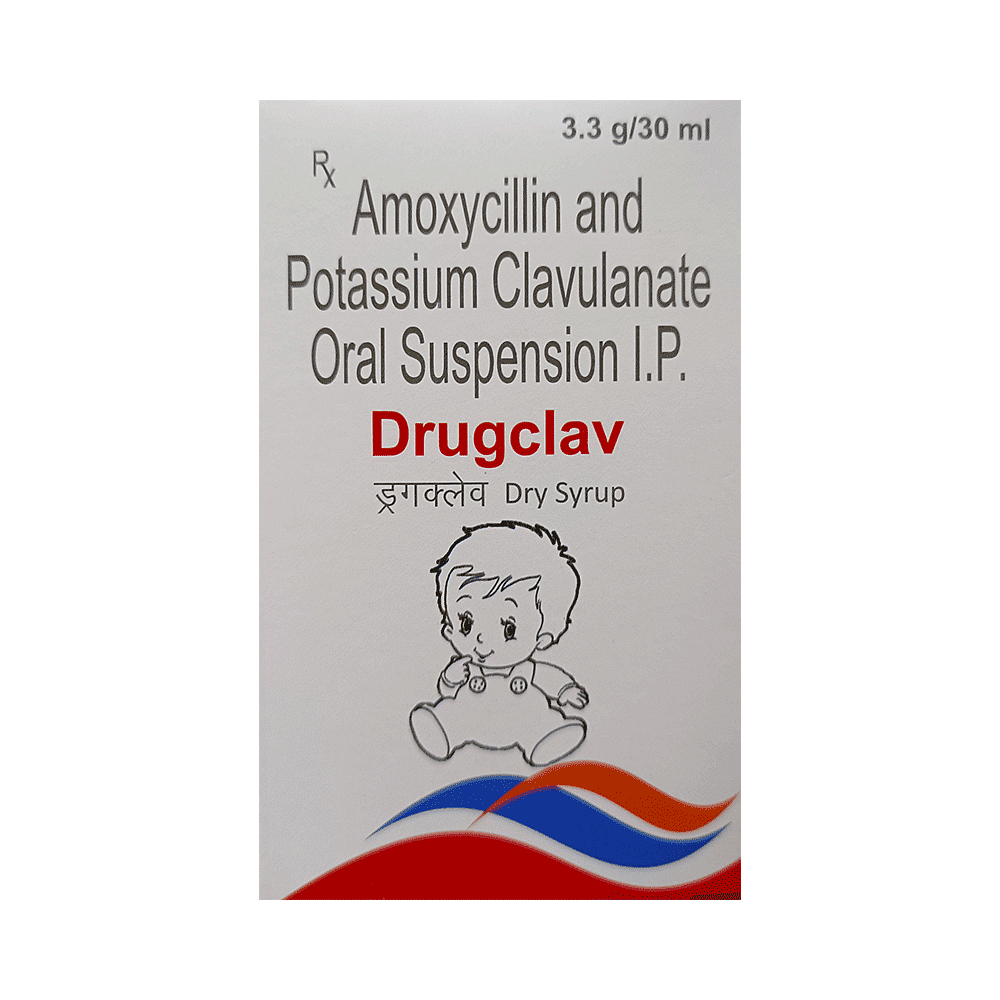
Drugclav Dry Syrup

Moxspot Dry Syrup
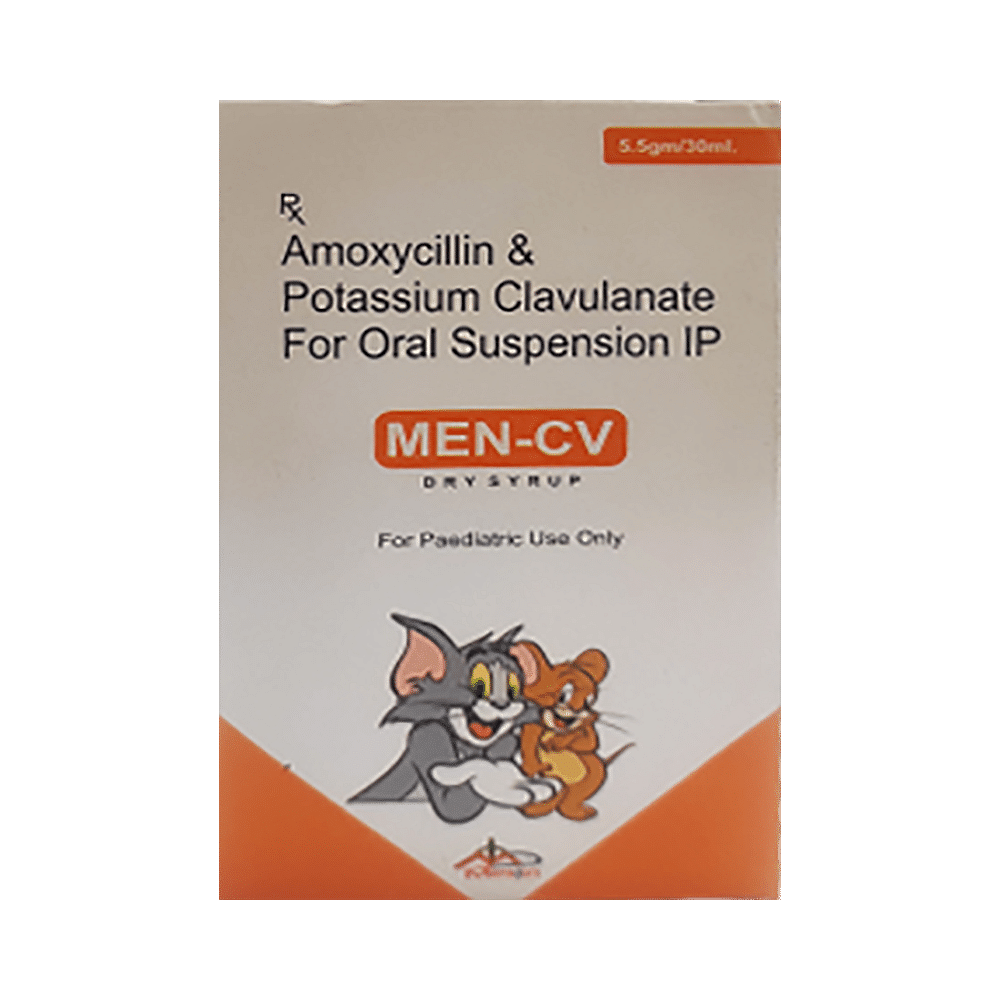
Men-CV Dry Syrup
Frequently asked questions
Can other medicines be given at the same time as Oligold-CV 228.5 Dry Syrup?
It is important to inform your child's doctor about all medications and substances your child is taking before starting Oligold-CV 228.5 Dry Syrup. Consulting with the doctor ensures safe medication combinations for your child's well-being.
Can I get my child vaccinated while on treatment with Oligold-CV 228.5 Dry Syrup?
While generally not interfering, antibiotics should be avoided before vaccination to avoid interference. Ensure your child is healthy and recovers from illness before receiving the vaccine. Consult your doctor for guidance after recovery.
Which lab tests may my child undergo while taking Oligold-CV 228.5 Dry Syrup on a long-term basis?
Periodically, monitoring kidney and liver function tests can be performed during prolonged treatment with this medication to assess your child's overall condition.
Can I give a higher than the recommended dose of Oligold-CV 228.5 Dry Syrup to my child?
It is not advisable to exceed the recommended dosage for Oligold-CV 228.5 Dry Syrup. Doing so may increase potential side effects. If your child experiences worsened symptoms, consult with their doctor for further evaluation.
Can I stop giving Oligold-CV 228.5 Dry Syrup to my child when the symptoms are relieved?
Do not discontinue Oligold-CV 228.5 Dry Syrup before completing the full course, even if you feel better. The medication may still be beneficial and prevent complications.
Can the use of Oligold-CV 228.5 Dry Syrup cause diarrhea?
Yes, Oligold-CV 228.5 Dry Syrup can cause diarrhea. This is due to its antibiotic action, which also affects beneficial bacteria in the child's gut.
Do all viral common colds result in secondary bacterial infection?
Most commonly, bacterial infections do not follow viral infections. Antibiotics should only be used after consulting with your child's doctor for proper diagnosis and management.
The mucus coming out of my child’s nose is yellow-green. Is it a sign of a bacterial infection?
Yellow or green mucus in the nose is often a normal response to a common cold, but it's important to note that these changes can last for 7-10 days and may not necessarily indicate a bacterial infection. If you have any further concerns, consult your child's doctor.
Is there any sign which shows that my child needs immediate medical attention?
Call your child’s doctor immediately if they experience serious allergic reactions (breathing difficulty, skin rashes), gastrointestinal problems (diarrhea), or liver damage (weakness, paleness, vomiting). These can be life-threatening situations and require expert attention.


